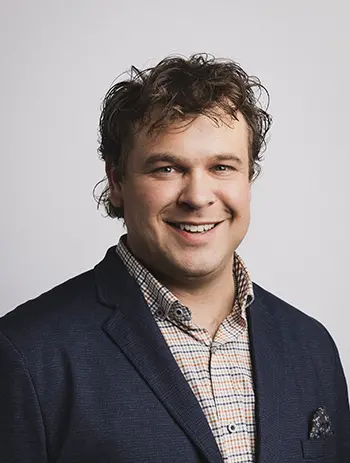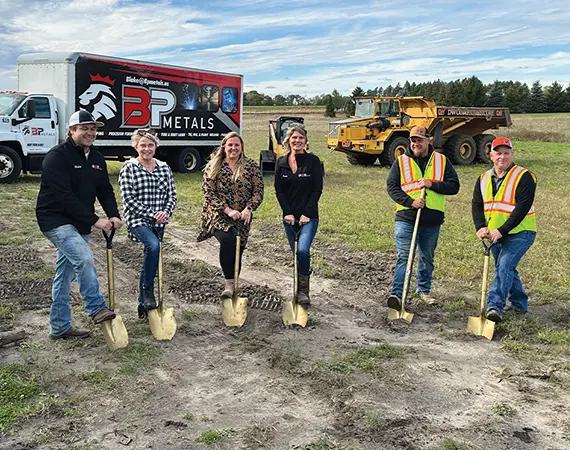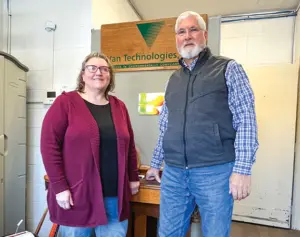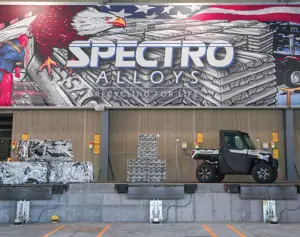John Reinke, managing director of Generation Growth Capital, says his company looked at over a dozen metalworking shops before deciding to make BP Metals one of three Midwest metal manufacturers it purchased in October to assemble a metal manufacturing platform called American Consolidated Metals.
It’s easy to see why BP attracted him. Over three years, the Isanti-based business has more than tripled its sales, boosting business by 264% and landing BP on the Inc. 5000 list of America’s fastest-growing private companies.
But it didn’t stop there. Reinke and his colleagues were just as impressed by the fact that while running hard, BP also transferred its operations from Blaine to a newly built facility in Isanti and earned its ISO 9001 certification heading into 2024.
“It showed that the organization was receptive to positive change and operational advancement,” he says. “It certainly signals to us that we’re going to be able to help execute on further growth down the line.

Blake Pendzimas, BP’s founder and owner, realized that maintaining the growth trajectory of his business was going to require adaptations, and improved systems. “(ISO) sets a lot of systems in place, documents things, and really puts a name on every operation we do. That didn’t always happen before,” Pendzimas says.
“I think there’s a lot about owning what you do,” he continues. “I don’t think we had a bad product before, but I think our product will be better going forward.”
Pendzimas had been looking for some outside help when Generation Growth Capital made its offer.
“We have been growing at such a rapid rate over the past few years that it was getting very difficult for me to handle by myself. So, we started looking at what we were worth and what we could do,” he recalls.
Along with bringing additional capital into the operation, BP’s new venture capital partner brings expertise, new resources, economies of scale, and greater buying power.
What’s more, Generation Growth Capital chose to keep Pendzimas on in a leadership role at BP.
“We’re more about growth than we are about expense reduction or rationalization,” Reinke says. “We tend to be more additive when we come into a company, particularly within the first year. We certainly look to invest in people and add additional people but not necessarily as replacements.”
“So, in Blake’s case, he has a good team. He has a growing business. He’s staying on as an owner and as the president of the company. He’s a young guy with a lot of fire in his belly, and he wants to continue to work and grow the great business he started,” Reinke says.
That growth shows no signs of slowing. BP is currently in the process of doubling the size of its 10,000-square-foot production plant, with an eye toward quadrupling its current footprint in the next few years. Reinke says new equipment is on order, too.
At present, BP employs 33 people. Its largest customers are active in the commercial food service, retail fixture, and agricultural equipment markets.
As for what sets BP apart from its competitors, Pendzimas says: “It’s just how well rounded we are with all the things we can accomplish in house.”
Besides talent, he says, “we have some of the biggest, most powerful lasers in the state. We can cut thick metals faster and more economically.”
The company is known for its sheet metal bending, cutting, and welding prowess, says Jim Schottmuller, Enterprise Minnesota’s director of business development.

Keith Gadacz, a business growth consultant for Enterprise Minnesota who has been working with BP since March 2023, says the company began reaping the benefits of the management system it had adopted, even prior to certification.
“That management system has formed a better structure for their calibration, their equipment maintenance, their scheduling and communication, their open-order capacity, as well as measuring the business to keep track of how it’s going on a scorecard to track their progress,” Gadacz says.
He refers to BP’s progress as “exceptional.”
“They’ve gone up not just one, but two plateaus of improvement. I mean, it really is remarkable where they were when we met to where they are today, and I see them moving up even more in the future,” Gadacz says.
“Keith has been a huge help,” Pendzimas says. “You can run wild without ISO for as long as you can, but eventually you’re going to hit some walls, and there are places you’re going to fail. That’s not to say we’re never going to fail on processes again. But it’s going to help us identify where we went wrong and how to steer the ship straight again,” he says.
Pendzimas says earning ISO certification has long been a personal goal, now finally realized.
Reinke predicts the credential will increase BP’s opportunities to land work as a tier 1 supplier to OEMs who demand ISO 9001 partners.
“That is definitely a door-opener,” Reinke says.
Pendzimas founded BP Metals in Blaine in 2000 but moved the operation to his hometown of Isanti in August 2022, after the community offered to sell him the land he needed to accommodate the current plant and anticipated future expansions for $1.
Plus, he says, “We really like the work ethic up here in Isanti. I think it’s a different crowd of people than we saw closer to Minneapolis.”
Pendzimas says the most-valued members of his team in Blaine made the move. “Pretty much everybody we wanted to come with us came with us.”
BP also lost a fair number of employees during the move but has had little difficulty finding replacements in Isanti, according to Pendzimas.
“We are aware of a lot of kids coming out of high school who need jobs, and just the connections we have in our community drive a certain level of respect when people walk in the door to apply for a job, because we know their mother or their father or their grandparents,” Pendzimas says.
Pendzimas says new recruits are drawn by the cleanliness of BP’s operations, the opportunities to grow with the business and the culture of the workplace, especially since the relocation to Isanti.
He says the town is located in farm country, and its rural nature has been conducive to building a cohesive team.
“On days when it gets hot, sometimes we’ll just close the doors, and we’ll rent 50 tubes, and we’ll go up the street and float the river,” Pendzimas says.
Pendzimas says he thinks the simple act of sharing a meal once a week builds and strengthens the company’s employee culture.
Return to the Spring 2024 issue of Enterprise Minnesota® magazine.


